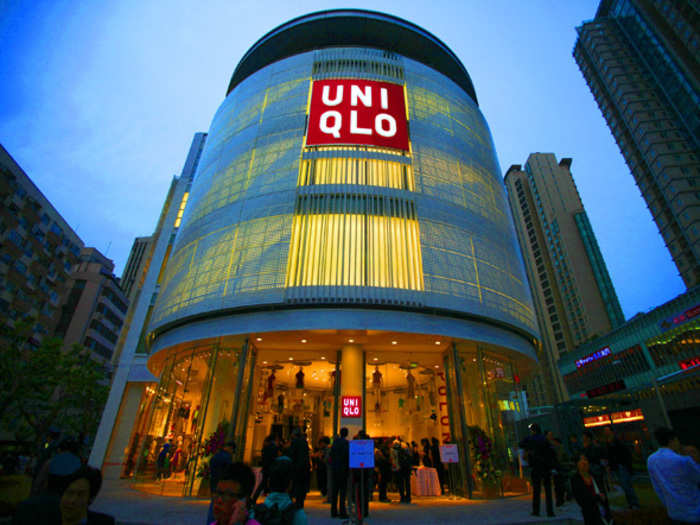
The company is a division of Japanese retail holding company Fast Retailing, with Tadashi Yanai at the helm. In addition to Uniqlo, Fast Retailing owns brands including J Brand, Theory, and Comptoir Des Cotonniers and National Standard.

The name is pronounced "YOU-nee-klo" in English.

The Japanese economic downturn is often called "The Great Recession" and lasted for an entire decade. It was bad news for the country as a whole, but Uniqlo reaped major benefits by catering to citizens who were trying to cut back on spending.

Most of the original growth was centered in the Japanese suburbs with roadside stores.

But soon after, Uniqlo hit a rut — with profits and sales dropping. The company reorganized and grew its women's line, seeing recovery afterward. It also began focusing on larger stores.

The company opened 21 stores in the United Kingdom by 2002, but only eight remained open in 2006. Fast Retailing executives said they didn't do a good job of establishing a "brand identity" before setting up shop and were learning from their mistake.

Uniqlo has 856 stores in Japan and more than 500 stores overseas in the U.S., France, Singapore, Malaysia, the Philippines, Thailand, China and Taiwan, among other countries.
Prime locations include major shopping streets in New York, London, and Paris.

In late 2012, the company was the fourth-largest retailer behind Gap, H&M and Zara-owner Inditex, according to Forbes.

The SoHo store was the first to open in 2006.

Most of its clothing is mass produced in every color a shopper might want. Some people have called the chain "Japan's answer to Gap."

Right now, a woman's long-sleeve silk blouse is $49.90, a man's long-sleeve button-up is $34.90 and boy's jeans are $22.90.

Uniqlo opened its largest store in Shanghai last year.

That's caused some problems in the past because of China's anti-Japanese protests. But Yanai has no plans to move, and told Forbes he wants to open hundreds more stores in China.

Facts and Details reports that Uniqlo admits to keeping clothes on the shelves longer than most rivals, and will sometimes make one item in up to 50 colors.

In the latest Forbes rankings, he's listed as Japan's second richest man and No. 45 on the worldwide billionaire list. Yanai is married and has two children.

According to the Wall Street Journal, Yanai called former Gap CEO Mickey Drexler "professor" when the pair first met because he held him in such high esteem.

And the company wants to grow receipts to reach 5 trillion yen ($49 billion) by 2020, with a fifth coming from the U.S., according to Chief Financial Officer Takeshi Okazaki.

He believes "an equal amount of work deserves an equal wage."

Blouses, slim-fitting bottoms and lightweight outerwear also are Uniqlo staples.

He's currently 65, according to Forbes. Some employees have said he isn't very good at delegating and can be a micro-manager. But his business mind is a big part of what's led the company to success.

They may have benefited from the world's drop in spending power, since they capitalize on consumers looking for cheap clothing.

The company plans to grow overseas Uniqlo sales to greater than domestic revenue by August 2016, according to Bloomberg.

 US buys 81 Soviet-era combat aircraft from Russia's ally costing on average less than $20,000 each, report says
US buys 81 Soviet-era combat aircraft from Russia's ally costing on average less than $20,000 each, report says 2 states where home prices are falling because there are too many houses and not enough buyers
2 states where home prices are falling because there are too many houses and not enough buyers A couple accidentally shipped their cat in an Amazon return package. It arrived safely 6 days later, hundreds of miles away.
A couple accidentally shipped their cat in an Amazon return package. It arrived safely 6 days later, hundreds of miles away. 9 health benefits of drinking sugarcane juice in summer
9 health benefits of drinking sugarcane juice in summer
 10 benefits of incorporating almond oil into your daily diet
10 benefits of incorporating almond oil into your daily diet
 From heart health to detoxification: 10 reasons to eat beetroot
From heart health to detoxification: 10 reasons to eat beetroot

Copyright © 2024. Times Internet Limited. All rights reserved.For reprint rights. Times Syndication Service.